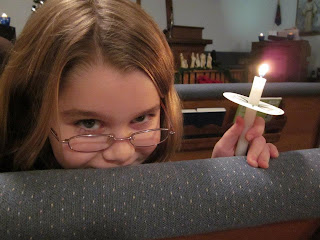ESR Professor of Peace and Justice Studies Lonnie Valentine brings us this report from the 66
th Annual Session of Pacific Yearly Meeting, held from the 13
th through the 18
th of Eighth Month, 2012 at Walker Creek Ranch near Petaluma, California:
(Walker Creek Ranch, photo from PYM website)
In returning to visit
Pacific Yearly Meeting as the ESR representative
after several years away, I was encouraged by the liveliness I felt
during the Yearly Meeting. I became a member of Orange County Meeting
which is part of Pacific YM, so have a fondness for the group that took
me in!
There seemed to be several features to
this annual session
that had grown stronger since I last visited. Of course, there were the
worries about what Quakers can do to stay connected to their young
people so they do not leave Friends, questions about how to nurture
spiritual growth in individual Meetings and also grow in numbers.
However, I was happy to see the increasing focus on Bible Study and
Quaker theology in this "unprogrammed" yearly meeting, the large number
of young Friends attending the sessions, and the increase in worship
groups to over one dozen (!).
In years past, I had worked with
one of the active members in facilitating Bible Study during the annual
sessions and we would have about 12-15 people attend. We were given the 7
am slot on the program, before coffee and breakfast. So, that number
attending seemed pretty good to me. For this session, we were moved to
the time right after breakfast, and now about 30 people showed up, most
returning for the entire week. As the facilitator said, "Since we are
given an after-breakfast time, we are now
really a part of the
program." I could feel the delight--and struggle--as we sought to take
the text seriously in a Quaker fashion, in spite of all the more prevalent interpretations of the Bible that these Quakers would reject.
We were invited into meditating on the biblical passages and then speak
from the heart about what we found encouraging or what we struggled
with in the text. Participants wanted to engage even the tough passages!
At least, that is what I saw happening, and I enjoyed not only
participating but seeing so many there invest themselves in the Bible
study.
Another new program event was a week long presentation and
discussion of significant Quaker figures, such as Barclay, Elias Hicks,
and Joseph John Gurney. As a theologian, of course I was pleased to see
Barclay being brought before the attenders (though of course, I would
question some of the way he was interpreted). However, that these
figures were being explored in my old Yearly Meeting made me proud!
Finally,
I was encouraged to see that the outreach efforts of the yearly meeting
were active and seemed to be well-supported. Since this YM is on the
West Coast, there has been some long-standing and deepening relations
with Meetings and Quaker work in Latin America. These Friends have
supported Casa de los Amigos in Mexico City, established a scholarship
support program for Friends in Guatemala, worked with co-partitives in
Nicaragua, and supported AVP work in Bolivia, including in prisons. The
reports from these efforts seemed to engage those attending. Finally,
several of the members of PYM who had film-making experience, showed
their film on the FWCC sessions in Kenya. This received rousing applause
from the crowd, and I would like to how this film at ESR after the
final editing is completed and would encourage other Friends to view
this film. It will be posted on the FWCC web site in the near future.
I
mentioned some of my positive impressions to one of the active yearly
meeting participants that I have come to know over the years. He said
he was encouraged to hear my perspective, since he often feels the
Meetings and the Yearly Meeting is struggling with its identity and what
it ought to do. I laughed since I felt that what I had seen during the
sessions helped me feel invigorated about my work at ESR, since I often
feel we at ESR need to do more as a school to work with Friends.
















